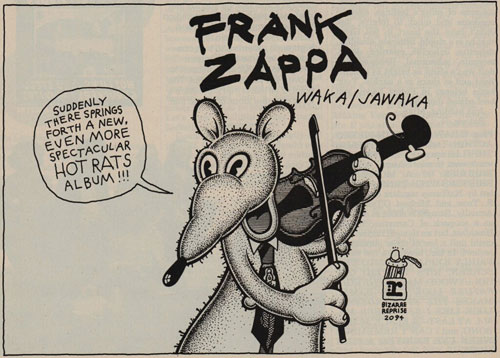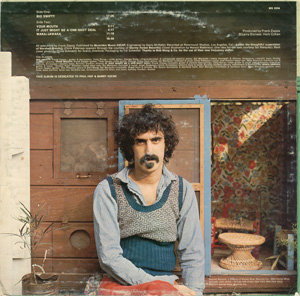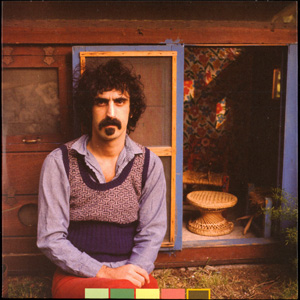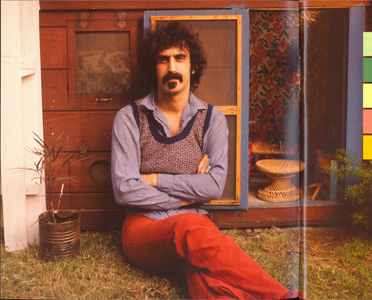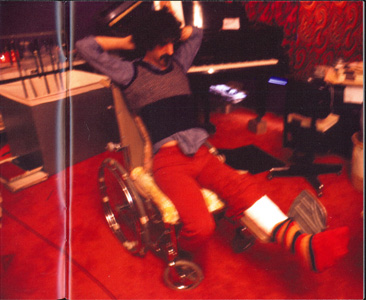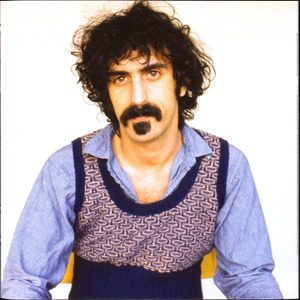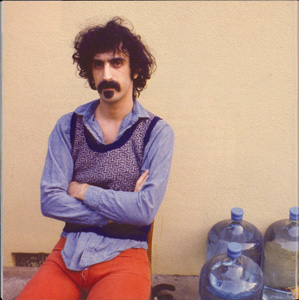Recording Sessions
Engineered by Kerry McNabb; Recorded at Paramount Studios, Los Angeles, Cal.; (under the thoughtful supervision of Marshall Brevitz) [...]
Paramount Recording Studios
Paramount Recording Studios was built in the late 1960's by the Brolin family. Encouraged by his brother, the well-known actor James Brolin, Brian Brolin [Bruderlin] opened the studio after gaining some renown of his own from his recording work with his former classmate Ritchie Valens. The Paramount Building was the original site of the famous "Bic Click" pen manufacturing plant, and next door was the original SIR Rehearsal and Rental location that got its start during a Jimi Hendrix session that was booked at Paramount. At the time James Brolin was under contract to Paramount Pictures and he named the new studio after his employer as a way of poking fun at such a large corporation.
The studio gained momentum with the mid-70's construction of the now famous Studio C, a classic Hidley-designed control room with a very spacious tracking room consisting of multiple rock, parquet wood, and glass surfaces, along with a 20-foot ceiling. Notably, the finish carpenter was James' young friend, then unknown actor Harrison Ford.
[Marshall Brevetz is] in Los Angeles. My last two albums were recorded in his studio, Paramount. He doesn't own it any more, though, it was changed over, sold out over somebody's head.
It was a good studio that's really good to work in but it's so busy that they don't have adequate time to maintain the equipment. So you take your chances. You go in there and a vital piece of equipment might not work. So the engineer will call the maintenance man who'll call Marshall who'll sort of show up with something to eat, you know, while you're sitting there waiting for the machine to work. We've been served barbecued dessicated chicken and hot dogs and many things. I had so many equipment failures there that the next time it's gotta be pheasant under chartreuse or I'm not coming back. Pathetic.
By the time Frank Zappa went into Paramount Studios early in 1972 to cut his Waka/Jawaka album, it had a 24-track facility.
Paramount Rec'g Studios (1966). 6245 Santa Monica Blvd., Hollywood 90038. Tel: 461-3717. Studio Mgr.: Marshall Brevetz; Chief Eng.: Brian Bruderlin; Mixers & Re-mixers: Bill Lazerus, Stan Agol, Kerry McNabb, Brian Bruderlin. [...]
Studio 1: [...] Scully 16-tr., 8-tr., Ampex 2-tr. [...]
Studio 2: [...] Scully 16-tr., 4-tr., 2-tr. [...]
The Mixing Room
And then, with Zappa, my friend Sal Marquez had gotten in the band, and this English bass player, Alex Dmochowski—he was a kind of rock star from England. And Zappa was doing Waka/Jawaka, got on section— and all that, all those horn parts were recorded in the bathroom of Paramount Recording [...], upstairs, in the earl— in the mid '70s.
Because Sal was a brilliant musician. He could write, he went to Berklee, played with Buddy Rich when he was like 18. So he would write the hardest stuff, you know. He could transcribe Zappa's guitar solos. You know how that was like [imitating wah-wah guitar solo]. It's just backwards stuff.
So [...] piccolo, trumpets; and we did that in the bathroom. It was a clothed bathroom, it was all tiled. It was big, and I remember while we were recording Zappa's leg was broken and he added in a cast—and Moog, Robert Moog was already up there hawking his wares, from the Moog synthesizer. I have a picture wearing a Moog t-shirt, I'll text it to you. It's a classic with long hair holding my kid—and that's that record.
You know, when he did Hot Rats, that was way more elaborate. You know, had all of these hot shot musicians, and I was never a fan of him and his music, and his manager was a thief. They were low life. They never paid anybody. You had to take them to the Union and really— They didn't want to pay anybody.
He put all the instruments down there because he was unique and he just, you know, the sky's falling, and he could put anything he wants eventually at a studio in his house and then when you would add up all the money you could have been making a thousand, two or three thousand dollars for being the leader of the session, for making up parts, to bring all your horns, and then you'd have to go get the Union to write a contract and then chase them down for months to get the money.
[...] Herb Cohen was a notorious thief.
[Original transcription from Javier Marcote.]
Dedications
THIS ALBUM IS DEDICATED TO PAUL HOF & BARRY KEENE
Waka/Jawaka (LP, Barking Pumpkin, 1987)
THIS ALBUM IS WAS DEDICATED TO PAUL HOF & BARRY KEENE
Paul Hof
Charles Ulrich
He's credited as one of the "technicians" on Fillmore 1971, for "special technical assistance" on The Grand Wazoo, and for "technical" on Apostrophe ('). Someone quoted on Patrick's page for Miss Janet referred to him as "equipment manager".
Here's what FZ himself said in an interview on WGOE, 11/3/72:
"Paul Hof is our main technician, who's been with me for a number of years. And he sees to it that everything works when we go onstage."
And at some point Paul Hof was married to Janet Neville Ferguson Hof.
Patrick Neve
He's credited with co-writing Spider Woman from the Ruben and the Jets album, "For Real!"
Session Sheets
04/14/72 (1-4PM) Paramount Recorders, Hollywood, CA—Think It Over [...]
MUSICIANS: FZ, Kenneth Shroyer, Aynsley Dunbar, Mike Altschul, JoAnn Caldwell,
Earle Dumler, Alan C. Estes, Fred Jackson Jr., Salvador Marquez, Malcolm McNab,
Anthony Ortega, Johnny Rotella, Ernie Tack, Robert J. Zimmitti, William M. Byers,
Anthony Duran, Donald W. Preston, Robert H. Ross (copyist), Russell N. Brown
(copyist), Vincent Bartold (copyist)
04/14/72 (5-8:30PM) Paramount Recorders, Hollywood, CA—For Calvin (And His Next
Two Hitch-Hikers)
MUSICIANS: FZ, Kenneth Shroyer, Aynsley Dunbar, Mike Altschul, JoAnn Caldwell,
Earle Dumler, Alan C. Estes, Fred Jackson Jr., Salvador Marquez, Malcolm McNab,
Anthony Ortega, Johnny Rotella, Ernie Tack, Robert J. Zimmitti, William M. Byers,
Anthony Duran, Donald W. Preston, Robert H. Ross (copyist), Russell N. Brown
(copyist), Vincent Bartold (copyist)
04/17/72 (5-8PM & 9PM-12midnight) Paramount Recorders, Hollywood, CA—Big
Swifty; Where Are You Coming From? (final title: "Your Mouth")
MUSICIANS: FZ, Aynsley Dunbar, George Duke, Salvador Marquez, Anthony Duran
04/18/72 (5-8PM & 9-12midnight) Paramount Recorders, Hollywood, CA—Minimal
Art; Blessed Relief
MUSICIANS: FZ, Aynsley Dunbar, Salvador Marquez, George Duke, Anthony P. Duran
04/19/72 (12-3PM & 4-7PM) Paramount Recorders, Hollywood, CA—It Just Might
Be A One-Shot Deal; Waka/Jawaka
MUSICIANS: FZ, Aynsley Dunbar, Tony Duran, Jeff Simmons, Peter Kleinow, Salvador
Marquez
04/21/72 (3-6PM & 7-10PM) Paramount Recorders, Hollywood, CA—It Just Might
Be A One-Shot Deal
MUSICIANS: FZ, Salvador Marquez
[...]
05/02/72 (12-3PM & 4-7PM) Paramount Recorders, Hollywood, CA—Spirit Of Love; Wedding Bells; Flash Gordon (final title: "Mah Man Flash")
MUSICIANS: Salvador Marquez (leador and only session attendee)
05/03/72 (6-9PM) Paramount Recorders, Hollywood, CA—If I Could Be Your Love Again
MUSICIANS: FZ, Salvador Marquez, Mike Altschul, Joel Peskin
05/05/72 (12-3PM, 4-7PM & 8-11PM) Paramount Recorders, Hollywood, CA—Big Swifty; Blessed Relief
MUSICIANS: FZ, Salvador Marquez, Mike Altschul, Joel Peskin
Tony Ortega
Anthony Ortega Interviewed by Steven L. Isoardi, University Of California, Los Angeles, September-November 1994
It was around 1971, '72. This bass trombone player, Kenny Shroyer, called me. He said, "Hey, Tony, Frank Zappa is organizing this group, this big band with all kinds of different weird instruments." He said, "Would you like to get involved with it?" He said, "He's paying for the rehearsals. You might have a gig or two, but he's going to pay for the rehearsals." And I said, "Sure, man." So I thought to myself, "Hey, this is going to be a snap. We're going to go in there and play a little rock and roll and get paid for the rehearsal." [...] So I got over there, and, man, here I see all these black notes. I could have dropped dead. All these black notes for the clarinet. He said, "Well, he wants you to play clarinet and alto with electronics, you know, with the hookups." I said, "Okay." So I had the hookups and everything. I was never so surprised, seeing all these different notes. It was very difficult, the clarinet part. All the guys had to take their parts home to practice them. You know, that was my whole different, new viewpoint altogether on Frank Zappa. [laughter] Because I wasn't familiar with him. All I knew was that he had a rock band, the Mothers of Invention. That's all I knew about him.
[...] I found out, man, that he had such difficult stuff there that some of the other musicians— Like one guy, I forget what he played-I think it was guitar or trombone or whatever, I forget what the guy, what his part was—he said, "Hey, Frank, this is impossible to play." Frank said, "No, it's not." He played it, man. In other words, whatever he wrote down he could play. He could play it, man, whatever he wrote down. And I thought, "Man, this guy is a genius." Like, I couldn't believe it. I almost went out to go buy some of his records, but I didn't go that far. [laughter] But I said, "Man, this guy is something else." So that was a whole new respect for him.
He had a European tour that was going to come up. He was going to go to London. But just right at this time, that's when Nelson Riddle got this Julie Andrews show. Harry Klee, a very fine altoist who had been with Nelson for many years, said, "Oh, Nelson, you've got to get Tony on this show." Of course, Nelson probably would have called me anyway, but Harry Klee really pushed it. So consequently I was on the show, I got on the show. So I told Zappa, "Well, I'm sorry, man. I would have liked to go out on the tour, but just right now I'm going to do this TV show. I've got to stay in town, because how often do I get a TV show?" So that's what happened. I ended up doing that TV show with Nelson, but that's basically— Well, I did one album with Zappa.
In the late 1960s, Ortega recorded with French jazz violin sensation Jean-Luc Ponty and future Frank Zappa keyboardist George Duke. In 1972, he was featured on former San Diegan's Zappa's excellent neo-big-band opus, "The Grand Wazoo." Ortega, who is credited on the album as "Tony 'Bat Man' Ortega," performs woodwind parts on "For Calvin (And His Next Two Hitch-Hikers)" and "The Grand Wazoo's" deviously intricate title track.
"Zappa paid all the guys on the album to rehearse, and I thought to myself: 'Oh, this will be a piece of cake! I'll just go play some rock 'n' roll'," Ortega recalled with a laugh.
"But, boy, he gave me a clarinet part that had these 64th note parts and I couldn't believe it. He was a very advanced musical guy and it was some really difficult stuff—when we were rehearsing, some of the guys couldn't play it. Zappa was a wonderful guy and I was surprised at how great he was. He was very talented, in all directions."
Aynsley Dunbar
Aynsley Dunbar, "Former Mother Drummer Aynsley Dunbar," Zappa! 1992, p. 17
By the time I finished playing with Frank, everything was all written down—even the drum parts. There were solo areas where you could ad lib, but the music was a lot more studied, and it started taking away from my thoughts. He really required a classical player, somebody who read, who was brought up with that sort of idea. Since I play with feeling more than sight-reading, there came a time when my mind just got bogged down with the technical side of things. I got to the point where I just had to get out and play some loose things, something more straight from the heart. I needed to play some more of me. Frank was in the hospital at that time, and it was at a point where we weren't doing anything anyway. When I told him I wanted to leave, he asked me if I thought I was doing the right thing, and I said I just had to play something simple for a while.
Well the reason Anysley's not with me anymore is because after The Rainbow I was off work for a year in a wheelchair—and a guys gotta go out and earn himself a living, and I wasn't touring, so he just went off and the next thing I knew he had a contract with Columbia. I still see him occasionally.
Don Preston
IB: What were the subsequent 'Waka/Jawaka' and 'Grand Wazoo' recording sessions like?
DP: Nothing unusual. I was in the studio by myself with Zappa and the engineers in the control room. I laid down my tracks and went home.
Erroneous
His real name is Alex Dmochowski, and he was not a US citizen, and he was in the country past the stay of his visa and he didn't belong to the musicians' union and so I wouldn't put his real name on the album. But he used to be the bass player with Aynsley Dunbar's Retaliation.
2. Your Mouth
Original album credits
Frank Zappa—guitar, Tony Duran—slide guitar, George Duke—tack piano, Sal Marquez—trumpet & vocal, Chris Peterson—vocal, Joel Peskin—tenor sax, Mike Altschul—baritone sax & piccolo, Erroneous—electric bass, Aynsley Dunbar—drums;
[...]
(Chris Peterson appears through the courtesy of Stormy Forest Records)
Joe Travers, Waka/Wazoo liner notes, 2022
4-10-1972
[...]
VOCALS: Chris Peterson and Sal Marquez
04/17/72 (5-8PM & 9PM-12midnight) Paramount Recorders, Hollywood, CA—Big
Swifty; Where Are You Coming From? (final title: "Your Mouth")
MUSICIANS: FZ, Aynsley Dunbar, George Duke, Salvador Marquez, Anthony Duran
Kris Peterson
I met Zappa through trumpet player, Sal Marquez. Sal was with the band at the time. I had been with a horn band from Dallas, TX [...]. Sal was in this band Of course, this band broke up but I went to LA with Sal and joined a band that didn't work out either but, with their manager, took this material and went to New York and recorded it with Richie Haven's label, Stormy Forest. I recorded one of Sal's compositions on this album and later moved out to LA to be closer to MGM Records where Richie was a subsidiary. Ran into Sal again and he introduced me to Frank.
[...] When we got to the studio to meet Frank, there was this black guy who walked over to us and Sal introduced me to him as the keyboard player with War. I told him I really liked his album and that I had been playing it all the way to LA. I also told him how hot it was on the East Coast and he didn't even know—it was a hit on the East Coast. He ran to call the rest of his bandmates. It wasn't but a month later and that album went wild!
Obviously, I also met Aynsley Dunbar and George Duke. And one night, Sly Stone came into the session with Billy Preston.
[...]
So Frank just presented you with this song—no audition?
No audition. He listened to my album. He knew I was capable. "Your Mouth" was just blues. And I had been working on a quasi scat style that wasn't really scat, and I interjected it in there as well. [...]
Did you record anything else with Frank?
I did some scatting on "Big Swifty." He wanted me to learn to read music—I didn't read—before he took me on the road. I enrolled in school and was in the middle of my second semester and I got a call from Detroit that I was needed at home, so I dropped out and came back to this area. My father was dying and my grandmother had moved in to my mother's house and my mother needed me. I had a daughter that was already in Detroit and my sister had her family, so I came home.
[...]
I could say that Frank was the ultimate gentleman and one of the most intelligent men that I have ever met. He was a family man and a good man, plus he had a perception to die for. Hopefully I've grown up enough to be able to see half of what he saw. He is still, "MY HERO"!
There will never be another Frank Zappa.
4. Waka/Jawaka
Original album credits
Frank Zappa—guitar, Don Preston—piano & Mini-Moog, Sal Marquez—trumpets, flugel horn & chimes, Bill Byers—trombone & baritone horn, Ken Shroyer—trombone & baritone horn, Mike Altschul—piccolo, bass flute, bass clarinet, tenor sax, baritone sax, Erroneous—electric bass, fuzz bass, Aynsley Dunbar—drums
Joe Travers, Waka/Wazoo liner notes, 2022
[DISC 1] 7. Waka/Jawaka (Outtake Version) 13:41
4-19-1972
Compiled from remaining outtake source material found on the master reel.
[...]
[DISC 2] 6.Waka/Jawaka (Alternate Mix) 15:53
Yup, the last track on "Hot Rats—Reel II," this mix was created before the master edit and overdubs had been created on the multi-track tapes, revealing the composition as it was tracked. Although Don Preston's solo here is unedited, FZ's solo had to be slightly edited due to the band losing track of the form. Inserted into this version is the Moog drum solo that was eventually abandoned. The end section reveals a frequency shifter guitar solo that was first unearthed in the quadrophonic mix featured on the QuAUDIOPHILIAc DTS DVD-Audio, released in 2004.
04/19/72 (12-3PM & 4-7PM) Paramount Recorders, Hollywood, CA—It Just Might
Be A One-Shot Deal; Waka/Jawaka
MUSICIANS: FZ, Aynsley Dunbar, Tony Duran, Jeff Simmons, Peter Kleinow, Salvador
Marquez
TS: Were you involved in any other sections or any other material other than "Your Mouth" at that time?
KP: Yeah [...]. The instrumental on that album, uhm . . . Wasn't "The Grand Wazoo," that's not yet.
TS: The title track?
KP: "Big Swifty," "Big Swifty."
TS: Oh, "Big Swifty," yeah.
KP: I'm singing some lines with the horns.
TS: Oh, really?
KP: On "Big Swifty." But you have to listen close . . . [sings]
The line she sings (at 9:16-9:23 in the interview) is actually from the title track of Waka/Jawaka. She sings at 6:32-6:41 and Sal Marquez sings at 6:41-6:43.
I don't think there's any singing in Big Swifty.
Besides doing transcriptions of guitar solos and drum solos, I've also done other things for him: lead sheets and orchestral stuff. Now, in order to accurately do a song that needs special care, such as "Waka / Jawaka" [from "Waka / Jawaka"], which was really tough, you have to take the masters and make several tapes of as many different tracks as you can get, because with the real close horn section in that song, it's almost impossible—if not impossible—to hear the individual voices. The human ear won't hear more than four voices moving in a closed-voice motion individually. [...] When your four horns hit a chord, it's really hard to hear. So you have to go in and really tweeze-up the mix.
Sources & edits
| Waka/Wazoo (2022) |
Quaudiophiliac (2004) |
Waka/Jawaka (1972) |
| 2.06. Waka/Jawaka (Alternate Mix) |
9. Waka/Jawaka |
4. Waka/Jawaka |
| 00:00-02:13 |
00:02-02:15 |
00:00-02:13 |
| 02:13-02:38 |
|
|
| 02:38-02:51 |
02:15-02:27 |
02:13-02:26 |
| 02:51-03:03 |
|
|
| 03:03-03:16 |
02:27-02:40 |
02:26-02:38 |
| 03:16-03:41 |
02:40-03:05 |
|
| 03:41-04:25 |
03:05-03:49 |
02:38-03:22 |
| 04:25-04:50 |
|
|
| 04:50-06:12 |
03:49-05:10 |
03:22-04:44 |
| 06:12-07:34 |
|
|
| 07:34-08:06 |
05:10-05:42 |
04:44-05:15 |
| 08:06-08:31 |
|
|
| |
05:42-05:55 |
05:15-05:28 |
| |
05:55-06:08 |
|
| 08:31-08:50 |
06:08-06:27 |
05:28-05:47 |
| 08:50-09:28 |
|
|
| 09:28-10:06 |
06:27-07:04 |
|
| 10:06-11:28 |
07:04-08:26 |
05:47-07:10 |
| 11:28-12:00 |
08:26-08:58 |
|
| 12:00-12:12 |
08:58-09:11 |
07:10-07:22 |
| 12:12-12:25 |
09:11-09:23 |
|
| 12:25-13:07 |
09:23-10:05 |
07:22-08:04 |
| 13:07-13:19 |
10:05-10:17 |
|
| 13:19-15:38 |
10:17-12:36 |
08:04-10:23 (*) |
| 15:38-15:53 |
12:36-12:49 |
|
| |
12:49-13:01 |
|
| |
|
[10:23-11:19] |
(*) only drum track?
